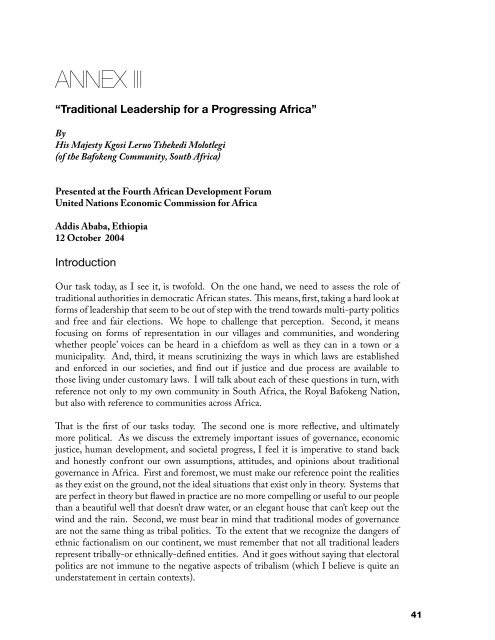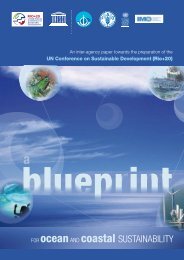Relevance of - United Nations Economic Commission for Africa
Relevance of - United Nations Economic Commission for Africa
Relevance of - United Nations Economic Commission for Africa
You also want an ePaper? Increase the reach of your titles
YUMPU automatically turns print PDFs into web optimized ePapers that Google loves.
ANNEX III<br />
“Traditional Leadership <strong>for</strong> a Progressing <strong>Africa</strong>”<br />
By<br />
His Majesty Kgosi Leruo Tshekedi Molotlegi<br />
(<strong>of</strong> the Bafokeng Community, South <strong>Africa</strong>)<br />
Presented at the Fourth <strong>Africa</strong>n Development Forum<br />
<strong>United</strong> <strong>Nations</strong> <strong>Economic</strong> <strong>Commission</strong> <strong>for</strong> <strong>Africa</strong><br />
Addis Ababa, Ethiopia<br />
12 October 2004<br />
Introduction<br />
Our task today, as I see it, is tw<strong>of</strong>old. On the one hand, we need to assess the role <strong>of</strong><br />
traditional authorities in democratic <strong>Africa</strong>n states. This means, first, taking a hard look at<br />
<strong>for</strong>ms <strong>of</strong> leadership that seem to be out <strong>of</strong> step with the trend towards multi-party politics<br />
and free and fair elections. We hope to challenge that perception. Second, it means<br />
focusing on <strong>for</strong>ms <strong>of</strong> representation in our villages and communities, and wondering<br />
whether people’ voices can be heard in a chiefdom as well as they can in a town or a<br />
municipality. And, third, it means scrutinizing the ways in which laws are established<br />
and en<strong>for</strong>ced in our societies, and find out if justice and due process are available to<br />
those living under customary laws. I will talk about each <strong>of</strong> these questions in turn, with<br />
reference not only to my own community in South <strong>Africa</strong>, the Royal Bafokeng Nation,<br />
but also with reference to communities across <strong>Africa</strong>.<br />
That is the first <strong>of</strong> our tasks today. The second one is more reflective, and ultimately<br />
more political. As we discuss the extremely important issues <strong>of</strong> governance, economic<br />
justice, human development, and societal progress, I feel it is imperative to stand back<br />
and honestly confront our own assumptions, attitudes, and opinions about traditional<br />
governance in <strong>Africa</strong>. First and <strong>for</strong>emost, we must make our reference point the realities<br />
as they exist on the ground, not the ideal situations that exist only in theory. Systems that<br />
are perfect in theory but flawed in practice are no more compelling or useful to our people<br />
than a beautiful well that doesn’t draw water, or an elegant house that can’t keep out the<br />
wind and the rain. Second, we must bear in mind that traditional modes <strong>of</strong> governance<br />
are not the same thing as tribal politics. To the extent that we recognize the dangers <strong>of</strong><br />
ethnic factionalism on our continent, we must remember that not all traditional leaders<br />
represent tribally-or ethnically-defined entities. And it goes without saying that electoral<br />
politics are not immune to the negative aspects <strong>of</strong> tribalism (which I believe is quite an<br />
understatement in certain contexts).<br />
41
















